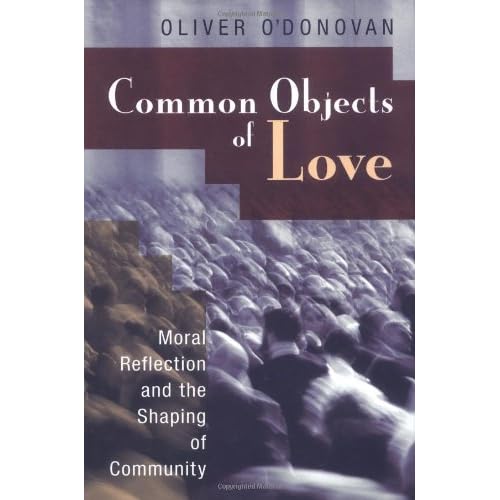Common Objects of Love

Oliver O'Donovan, Common Objects of Love: Moral Reflection and the Shaping of Community, William B. Eerdmans: 2002, 72 pgs.
In The City of God, St Augustine revised Cicero's famous definition of a community to read: "a multitude of rational beings united by agreeing to share the things they love." This definition of a community or a people provides the structure of Oliver O'Donovan's 2001 Stob Lectures, which are the content of this book. Chapter one considers "objects of love," chapter two "agreement to share," and chapter three "a multitude of rational beings united." Delivered within months of 9/11, these lectures consider some of the multifaceted intersections between politics and religion, a topic to which O'Donovan has given considerable attention to over the years. In the face of rising patriotism and modern publicity based community, O'Donovan draws the readers attention back to the logic of a universal human community founded in Christ. This community necessarily relativizes devotion to all more restricted, humanly founded associations, reveals some of the hidden idolatry behind modernity, and pulls us back to the single representational focus of the Christian community: the Eucharist, the sacrifice of Christ which allows us to celebrate a feast together, united in a way previously impossible.
O'Donovan begins in the esoteric and cloudy heights of political moral philosophy and theology, exploring such issues as how our ability to reflect morally on past actions challenges the common distinction between two types of reasoning: truths and decisions. Such questions, while interesting to the philosophically minded, hardly make O'Donovan's first two chapters easily accessible. These are, after all, lectures delivered to a specific, highly educated, as well as interested, audience on a specific topic. Thus, O'Donovan assumes a certain level of working knowledge which, if one were lacking, would make this short book practically meaningless. Be that as it may, for the interested, O'Donovan offers nothing less than pure gold. The third chapter, in particular, is more than worth the wait. In it, O'Donovan offers a penetratingly insightful analysis of some of the characteristics of modernity, particularly as it represents itself (to itself) through publicity and the communications trinity of news, entertainment, and advertising. This he contrasts with the ascesis necessary for a true Christian community, and which is called for by Christ. (Ascesis is the big word I learned from this book; I'm so glad I found a way to fit it into my blog :)
I know I'm weird when a book like this feels like a breath of fresh air after reading Lucado. Anyway, I definitely recommend this book to those with interest in the topic.
Comments